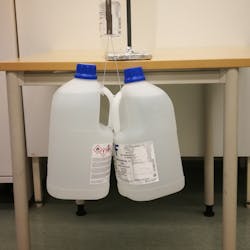Biochemical Process Produces Promising Polymer
A new supramolecular plastic is both degradable and highly recyclable, report its developers at the MediCity Research Laboratory of the University of Turku, Turku, Finland. The team repurposed a biochemical process to create the material.
The process, called liquid/liquid phase separation (LLPS), is more often used by biochemical systems in the formation of micelles, vesicles and fibers. LLPS occurs where a dense phase forms from a dilute phase at the thermodynamic equilibrium point. This, in turn, gives rise to stable compartments in the solution that sequester and concentrate solutes.
The Turku team, led by senior researcher Jianwei Li, has shown that LLPS can be a powerful strategy to explore supramolecular plastics using phase-segregating ionic complexes consisting of cationic-charged macrocycles and counter-charged surfactants. The small-molecule-based material formed this way is called a macrocycle-surfactant phase-separated (MSPS) material. An article in a recent issue of Angewandte Chemie provides further details.
The MSPS material’s properties highly relate to water content, the researchers found. For example, when saturated, the material behaves like a fluid and can self-heal instantly even under water. It also showed “top-of-the-range” waterproof adhesiveness — in one experiment holding together for over a month two plates of steel that, in turn, supported jugs weighing 16 kg (lead image). Less water content made the material transition to a gel with mechanical properties comparable to those of traditional covalent polymers.
Further, the material displays high levels of processability, while its redox-sensitive disulfide bonds make it degradable and highly recyclable, the researchers say.
According to the team, these findings suggest that LLPS represents an effective and powerful strategy for constructing robust bulk supramolecular materials with adhesive properties and offers an approach for exploring eco-friendly materials that potentially could substitute for conventional covalent polymers. In particular, the researchers believe the new material may have broad applicability for practical uses such as for recyclable plastics and smart soft materials.
“Comparable with conventional plastics, our new supramolecular plastics are smarter as they not only retain the strong mechanical property but also reserve dynamic and reversible properties that made the material self-healable and reusable,” emphasizes postdoctoral researcher Jingjing Yu.
Li plans to create additional interesting materials with the LLPS process in the near future in his research laboratory.
About the Author
Chemical Processing Staff
Chemical Processing's editors cover industry news relevant to readers. You can email your news items to Editor-in-Chief Traci Purdum at [email protected].
